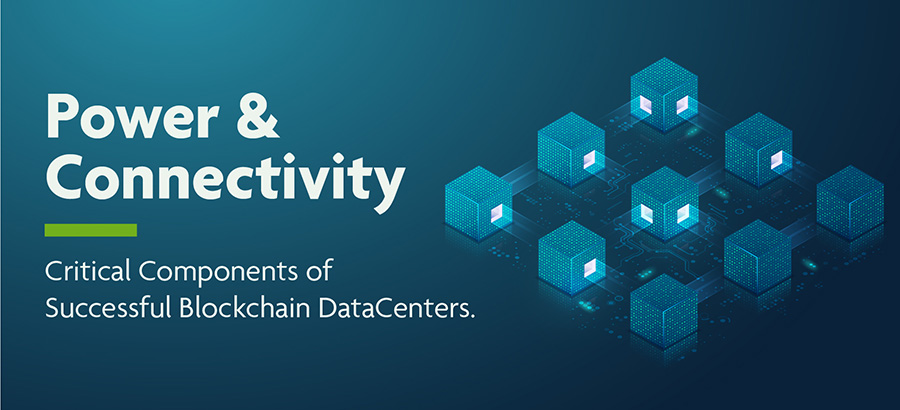Blockchain technology and cryptocurrency are transforming the way information is distributed and how digital assets are shared.
Datacenters today must adapt to these modern technologies to keep pace with their customer’s needs. The new datacenter requires an infrastructure that can provide rapid, secure data transmission through reliable, scalable, high-capacity bandwidth that meets the processing demands of blockchain systems. One of many changes is the facilitation of a steady increase in capacity from the always-on user.
Traditional datacenters have historically focused on data storage to house critical applications and information. These facilities are filled with routers, switches, firewalls, storage systems, servers, and application-delivery controllers that hold volumes of data. All of these resources and components ultimately deploy cloud services on “the edge” of the internet. Typically, these conventional datacenters expect ebbs and flows to the traffic patterns. Their top concern has remained unchanged: uptime. With a focus on diversity and reliability these datacenters have battery backups, generator backups, and diverse providers to guarantee constant access for their customers.
Blockchain is a system that acts as a digital record-keeper, verifying and cataloging changes to data sets worldwide. Interest remains high and trading is active. As the market continues to grow and the demand for blockchain applications multiplies, modern datacenters have a new concern to address. In addition to providing space, power, and reliable connectivity, these organizations must meet evolving the requirements for real-time, multi-user, constant data retrieval.

Datacenters focused on this sector are facing critical uptime requirements as they must facilitate the constant need for faster data transmissions to an increasing number of worldwide users and devices. To meet these technological requirements, blockchain datacenters are evolving to support this next generation of cloud services.
Critical to the success of blockchain datacenters are 2 assets: 1) Power and 2) Connectivity.
FiberLight recently conducted a study of more than 600 IT executives, and discovered that as many as 78% of these business leaders are considering Texas for their relocation and expansion plans. Drawn by a lower cost of living, favorable tax rates and fewer regulations, many blockchain datacenters are cropping up in rural areas of Texas where power is plentiful, however, sourcing reliable connectivity to the internet can be challenging. As one of the largest infrastructure providers in Texas, FiberLight is positioned to uniquely meet the needs of these datacenters.
Rural connectivity is an area where FiberLight indeed shines. As a regional provider, we focus on servicing deep within our footprint. FiberLight goes beyond metropolitan areas and reaches far into rural communities, striving to connect everyone, close the digital divide, and future-proof broadband. Our delivery of a better, far-reaching, internet infrastructure positions us to meet blockchain datacenters where they want to be.
In addition to needing fiber in remote locations, these crypto-currency, traffic-driven datacenters also often require path diversity, PoP diversity, dual entry, and custom designed networks. As an infrastructure provider with one of the largest fiber networks in Texas, FiberLight can meet these requests. With a construction background, FiberLight is known for our ability to customize networks, providing best-in-class infrastructure to support reliable, ultra-low latency, always-on lit or dark services.
As owner and operator of our own fiber network, we are always expanding our reach to meet our customers growing bandwidth requirements.
FiberLight designs, builds and deploys mission-critical high bandwidth networks to ignite our client’s digital transformation. With 17,000 route miles of fiber networks and 78,000 pre-qualified near-net buildings, FiberLight operates in over 30 metropolitan areas in the U.S. Our service portfolio includes high-capacity Ethernet and Wave Transport Services, Cloud Connect, Dedicated Internet Access, Dark Fiber and Wireless Backhaul serving domestic and international telecom companies, wireless, wireline, cable and cloud providers as well as key players across enterprise, government, and education.
